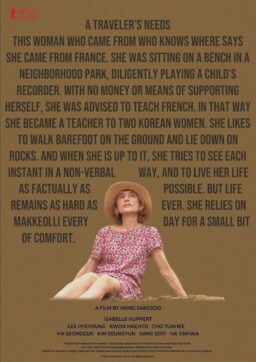Elisabeth Subrin’s “A Woman, A Part” had its North American
premiere last night at BAMCinemaFest in New York City. Starring Maggie Siff,
Cara Seymour and John Ortiz, Subrin’s drama is an insightful, heartfelt
examination of acting, and how it can allow us to access emotional parts of
ourselves that we otherwise wouldn’t but can also serve as a cover against
being truly genuine. Siff, so incredible this year on “Billions,” proves that
her continually rising fame is no fluke, while Seymour and Ortiz deliver in
supporting roles. “A Woman, A Part” owes a debt to John Cassavetes in the way it
examines gender roles and the life of an actress, but it feels confidently its
own piece at the same time.
Anna Baskin (Siff) isn’t doing very well. She’s famous
enough from her recurring role on a hit TV series to get recognized in public
but she’s increasingly dissatisfied with the part (echoes of how much Siff, at
least to me, felt wasted on FX’s “Sons of Anarchy”). After an incident in which
she dared ask about a clichéd scene she was performing in, Anna begins
to spiral a bit. She’s lonely, depressed and tired of playing the same garbage
roles. She tells her manager Leslie (Khandi Alexander) that she’s ready to quit
acting, even if that means breaking her TV contract—industry suicide. To get a
little closer to herself, she goes back to New York City to find her two best
friends from her theatre days, neither of which she’s seen in years.
Isaac (Ortiz), a struggling playwright, is happy to see
Anna, partially because he seems like a genuinely warm, nice guy, but also
because he’s trying to rekindle a little of the creative spirit that might have
been dulled by age. Could Anna returning into his life get him over his writer’s
block? Kate (Seymour) is more reticent to allow Anna back into their lives. She’s
a struggling alcoholic who doesn’t really act anymore and she’s naturally
concerned that Anna will bring back some of the demons she’s worked so hard to
bury. Subrin is very smart at capturing how much rekindling with our old
friends can threaten to force us back into self-destructive patterns or
question decisions we’ve made since. Ortiz and Seymour have been consistently
good for years, and Ortiz especially understands the mind of an actor, having done
so much great stage work with LAByrinth Theater Company.
However, this is Siff’s film, and she’s remarkable as a
woman who feels like she’s seeking the last time in her career in which she
felt truly satisfied. She’s become famous, but the hollow nature of television
acting, especially when compared to the experimental theatre she did in New York,
has left her feeling empty. In a sense, she’s using her friends to remind her
why she’s an actress, or convince her that she shouldn’t be one anymore. And
when she learns that Isaac has written a play about his youth, with a
not-too-flattering iteration of Anna, she questions the decisions she’s made
even more. I kind of hate that Subrin felt the need to include a revelatory
argument around the hour mark in which Anna, Isaac and Kate define their pasts
and their needs, but the film quickly recovers. “A Woman, A Part” works best as
an observational piece, watching an actress who has for years tried to define
what her characters want, without ever asking herself the same
questions.
A second screening of “A Woman, A Part” is scheduled for Sunday, June 26 at 6PM. Click here for more information












